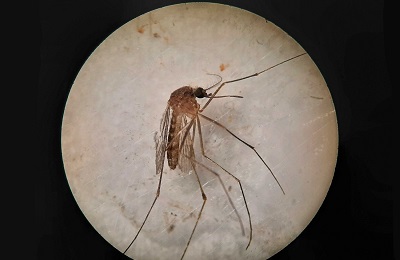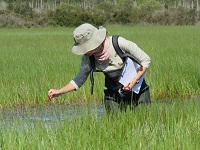The Spanish National Research Council (CSIC) launches a research project to monitor mosquito populations and the presence of virus West Nile in real time in several locations in the lower Guadalquivir during 2021 and 2022. It is planned to carry out weekly captures of the díptera in the Sevillian municipalities of Coria del Río, Puebla del Río and Palomares del Río, the three localities of the area being most affected by the West Nile Virus last year. Researchers will carry out a monitoring work through molecular analysis to detect the presence of the virus in insects. The project is promoted by the CSIC Global Health PTI and is funded by the European Union recovery plan for the Covid-19 crisis.
The outbreak of the West Nile Virus in the provinces of Seville, Cádiz and Badajoz caused 77 cases of serious illness and 7 deaths. Although most human infections are asymptomatic, the disease can lead to meningitis, encephalitis and acute flaccid paralysis. Experts highlight the importance of entomological surveillance programs to prevent new outbreaks. For decades, the CSIC has collaborated with institutions such as the Mosquito Control Service of the Huelva Provincial Council, the Animal Health Research Centre (CISA-INIA-CSIC), the Center for Biomedical Research in the Epidemiology and Public Health Network (CIBER ISCIII) and the Carlos III Health Institute.
"With this project we hope that the search for viruses in mosquitoes will allow us to detect the moments of greatest risk of virus transmission in the area in advance", explains Jordi Figuerola, CSIC researcher at the Doñana Biological Station (EBD-CSIC). "We are confident –he adds- in being able to identify the diversity of viruses transmitted by mosquitoes in the area and to understand the mechanisms by which they remain in circulation. It is necessary to better understand how climatic and ecological conditions affect the transmission of the West Nile virus to predict the risk of transmission each season based on environmental conditions and to understand how climate change can affect the transmission of these viruses ".
The scientist hope that results will have an impact in both the short and medium term. "In the first place, during the duration of the project, it will allow us to warn the health authorities if there is a high incidence of the West Nile virus in the area. In the medium term, we hope to be able to predict changes in mosquito populations and the risk of virus transmission weeks in advance"says Figuerola.
Experiencia en la detección
The research team participating in the project has been working with mosquito populations in the area for years to determine how they affect the climate and the environment in their distribution and abundance, as well as the diseases they can transmit. In 2020, as a consequence of the outbreak detected in Andalusia and Extremadura, they focused on determining whether the virus was transmitted in urban areas and finding out what species of mosquitoes and birds were involved.
The data confirmed that the virus had been transmitted within the towns of Coria del Río, Puebla del Río and Palomares del Río and that the main transmitters were two indigenous species of mosquitoes: Culex perexiguus and Culex pipiens. The study, developed with funds from the CSIC, also pointed out that the virus multiplied in birds such as blackbirds and sparrows, which live in urban areas, and was transmitted to people through mosquitoes in urban areas.
The EBD-CSIC offers updated information every week on the abundance of mosquitoes in the Lower Guadalquivir through the website http://mosquitos.ebd.csic.es .
www.csic.es/es/actualidad-del-csic/cientificos-del-csic-investigan-la-circulacion-del-virus-del-nilo-en-el


 La Fundación Jaime González-Gordon ofrece cuatro becas para el desarrollo de Trabajos de Fin de Máster sobre Doñana
La Fundación Jaime González-Gordon ofrece cuatro becas para el desarrollo de Trabajos de Fin de Máster sobre Doñana
